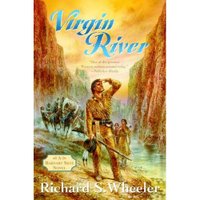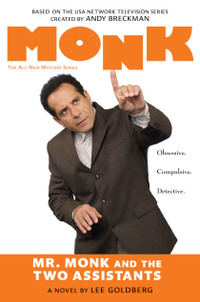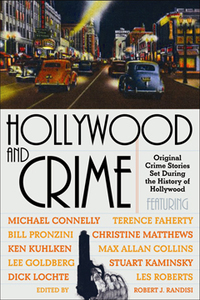
Here’s a sneak peek at the cover for MR. MONK IS MISERABLE, which is coming next fall.

#1 New York Times Bestselling Author & TV Producer

Publishers Weekly has given a rave review to my friend Richard Wheeler’s new novel VIRGIN RIVER. They say, in part:
Barnaby Skye returns for his 16th stirring western […]Wheeler’s lucid prose and excellent eye for detail make history come alive once again.
Blogger Gerald So has reviewed MR. MONK AND THE TWO ASSISTANTS and I am pleased to say that he liked it. Among his comments:
Indeed this is Goldberg’s most novel-suited premise yet. He adds just
enough spice to bring out the assistants’ differences for tension and
character study. In the mind-blowing final third of the novel, Sharona
and Natalie are accused of separate murders, and Monk seems even more
aloof in their time of need. Readers know, of course, neither of them
is a murderer. The fun is in seeing how, or in this case if, Monk proves it.

I heard over the holiday from my old friends Randy & Jean-Marc Lofficier. They are having great success with their Black Coat Press, which does English translations of classic French mysteries, comics and stage plays. Their titles include three classic Arsene Lupin-Sherlock Holmes novels from the early 1900s and NICK CARTER VS. FANTOMAS, a never-before-translated play from 1910 (the book also include an extensive introduction by Jess Nevins on the history of Nick Carter). Check them out!

The paperback edition of MR. MONK AND THE TWO ASSISTANTS comes out in bookstores nationwide today. The book got some very good reviews, like this one from the Weekly Journal in Angleton, Texas:
"Even if you aren’t familiar with the TV series "Monk", this book is too funny to not be read. Goldberg’s comic genius
is channeled by Monk throughout and the truth of the crime is always
worth waiting for. Reading this book is like reading a script of the
weekly show, making this read a delightful treat for any fan."
But I think my favorite comments came from readers on Amazon, especially this one from reader in Australia (his name is Lee, but it’s not me!):
To me Sharona and Natalie were interchangeable.
Then I read this book.
It goes as far as acknowledging that Natalie’s character began as a
Sharona clone, yet explains how she’s evolved into something more. In
fact, there are lots of jokes in Natalie’s narrative that tap on – if
they don’t actually break – the fourth wall, and it has the effect that
postmodernism should: By acknowledging its own artifice, addressing the
audience directly, it paradoxically becomes more a part of the real
world to deliver everything that’s real about the personalities and
truths about human nature within the fiction. In doing so, this book
made me care for the first time about Natalie AND Sharona.
I hope you enjoy the book, too.
It was bad enough when Amazon offered customers the opportunity to buy lower priced, used copies from second-hand booksellers on the same page as the new books they were selling. Now it’s even worse.
I was dismayed today to discover that Amazon is selling remainder copies of MR. MONK AND THE TWO ASSISTANTS on the same page as the full-priced hard-cover and the new paperback release, which comes out tomorrow.
I can’t say I’m too happy about this. Amazon is costing me money…but even so, I’m not sure that I’m ready to support an effort to legislate a cut for authors of second-hand sales.
Novelists Inc, a non-profit organization of multiply-published novelists, is advocating a rewrite of the copyright laws that would force second-hand booksellers to pay authors a percentage of the cover price for any book that’s resold within two years of its original publication.
NINC recommends that commercial used-book sellers be
required to pay to publishers a “Secondary Sale” fee
upon the reselling of any book within two years of its original publication
date. A percentage of these fees would then transfer to authors in accordance
with contractual agreements between authors and publishers, thereby reinforcing
the Founders’ intent, as stated in Article I of the Constitution, to
protect authors’ exclusive right to benefit from their work.Ninc further recommends that the fee paid to publishers and
authors would be some fair percentage of the cover price of the individual
book. While
it has been argued in the past that such a fee would unduly burden used-book
sellers by increasing administrative tasks, that argument is rapidly becoming
moot. Today, the largest sellers of used books have a strong Internet presence,
allow Internet-based sales transactions, and maintain records of their sales
and inventories, at least in part, by using ISBN numbers, as do other booksellers.
The use of ISBN numbers to track sales is the same process whether it is being
used by a used-book seller or a seller of new releases, and makes the payment
of a fee a simple matter when calculated and transacted electronically.
I’m feeling the pain of lost royalties, but I’m not sure that the proposed legislation is a good idea. What’s next? Should we insist that people pay a percentage on any CDs, DVDs, sofas, and cars that are re-sold within two years of their original release?
I have heard it argued that asking for a percentage of subsequent sales is no different than, for example, artists getting royalties on the reruns of TV shows. As someone who straddles both fields — publishing and screenwriting — I see a big difference.
In the case of a TV show, I am writing the script for the studio, which then exploits that product in many different ways — licensing it to a network for broadcast, licensing it to a cable network for re-broadcast, selling it on DVDs, etc. In almost all of those scenarios, the studio retains ownership of the product. They are, in effect, lending it to someone else and sharing in the proceeds of this alternative exploitation of the product. As an artist, I share in whatever the studio gets, no matter how it is exploited.
But there’s a difference between exploitation and consumption. When the studio sells the show to a consumer as a DVD, I get a share of the sale price. The consumer owns the DVD itself (though not the copyrighted content that it contains). If the consumer decides to resell the DVD, the studio gets nothing from that sale and neither do I. The consumer paid for the DVD, he should have the right to resell that physical object if he pleases. That seems reasonable to me…even though I am losing money in all kinds of ways as a result. But I also believe in basic consumer rights and simple capitalism.
The DVD example is much closer to how things are with books.
In the case of a book, I write a novel for a publisher, which then exploits that product in many different ways — hard cover publication, paperback publication, e-book publication, foreign language publication, audio books, etc. In all those scenarios, the publisher retains control of the product (for a limited time as determined by my contract). I share in whatever proceeds they get. When a consumer buys a book, I get a share of the sale price. That’s end of the revenue stream for the publisher and for me, too. The consumer owns the book itself, though not the copyrighted content. As it stands now, and as it has for centuries, once you buy a book, that physical object is yours to do with as you please. You might not own the content, but you own the book itself.
I can certainly see the huge benefits for writers, and the publishing industry, in the proposed two-year/shared proceeds legislation…but as someone who loves to buy used books, I can also see how it could unfairly infringe on consumer rights, inhibit capitalism in its simplest form, and how it could set a dangerous precedent that could be extended to other products.
What do you think?

I got a nice surprise with my breakfast bagel this morning. Paula Woods reviewed the anthology HOLLYWOOD & CRIME in today’s Los Angeles Times and gave my story a rave:
Lee Goldberg’s "Jack Webb’s Star," is a riotous caper crime with a
nasty twist that starts in a traffic school class in the Taft building,
where among the offenders is a hapless man ticketed for drunk driving
in his wheelchair.
She also singled out stories by my friends Dick Lochte, Gar Haywood, and Michael Connelly for praise.
You can order the book here.
There’s a lot to enjoy in today’s LA Times Book Review. For one thing, there’s Seth Greenland’s amusing essay on why everybody in Starbucks is writing novels instead of scripts these days (and it’s not because of the strike).
Remember when your real estate agent was working on a screenplay? Or
that one your cousin the accountant was writing? Or the script your
dental hygienist was laboring on, which she pitched to you in its
entirety while your mouth was wrapped in a dental dam so you couldn’t
politely beg her to shut up?
That’s so true. I was immediately reminded of my partner Bill Rabkin’s wedding. Just before the ceremony, his Rabbi pitched us a detective show about three private eyes — one blind, one deaf and one who couldn’t speak. I once got a pitch while getting a flexible sigmoidoscopy (don’t ask). Seth goes on to say:
Those days have mercifully ended. Now, aspiring writers in
Southern California are abandoning their Final Draft software and
thronging to the novel writing classes at UCLA Extension. What’s going
on here? Are there larger cultural doings afoot?
I know that’s true, too. My brother Tod has had more than a few screenwriters and showrunners in his novel-writing class lately. Seth attributes the change to Hollywood’s growing reliable on blockbuster, high-concept films .
Dialogue and character? Forget it! What people really wanted was
spectacle. The thinking writer’s Hollywood was disappearing. The
aesthetic shift ushered in by Spielberg’s mechanical shark was
completed two years later with the release of "Star Wars." This,
essentially, is the movie business today. And yet, this is also why a new generation of novelists is being born
I also enjoyed reading Mark Lamster’s wickedly critical review of John Silber’s "Architecture of the Absurd," a book I bought two weeks ago in the museum shop at the Pompidou Center in Paris and read on the plane home. I’m not plugged into the architecture scene, but reading the book, I got a sense there was more to Silber’s critique than met the eye. Turns out I was right:
That Silber sees the architect as inordinately powerful is not
surprising. His father, the book’s dedicatee, had an architectural
practice in Texas, for which Silber fils
occasionally worked. Ever since, it seems, he has engaged in a kind of
Oedipal drama, brazenly attacking the profession’s authority figures.
He recalls an incident at a dinner in 1952 when, "much to the
consternation" of his father, he attempted a battle of wits with Frank
Lloyd Wright: "Wright was not impressed and quickly dismissed my
impertinence." Years later, we find Silber, now a professor at Yale,
pestering Louis I. Kahn for not putting Plexiglas switch plates in the
university’s art gallery. "There was no response." Go figure.Predictably, Silber is the hero of his story, a one-man bulwark against
architectural folly. At Boston University, he claims to have overseen
more than 13 million square feet of construction. Nearly all of it
lacks intellectual ambition, and no wonder. Under his regime,
architects were kept in line: "I dismissed their elaborate, high-flown
aesthetic justifications of design features as gratuitous bloviation."
He would know about bloviation. In a book devoted to architectural
indulgence, Silber sets a standard for arrogance far exceeding that of
his subjects.
The pictures in the book are still worth the cover price. All in all, the book review section today was surprisingly enjoyable and accessible…something you could never say about the LATBR under Steve Wasserman’s watch. That said, I’d still like to see more mysteries and thrillers reviewed…and judging by the LA Times Bestseller list, in which six of the ten books are mysteries or thrillers, it’s what Southern Californians are reading.
 I ran into Scribe-award winning author Christa Faust on the picket line yesterday. Her book MONEY SHOT just came out this week and is already getting lots of positive buzz. I forgot to thank her again for talking up tie-ins, and her Scribe Award, in her
I ran into Scribe-award winning author Christa Faust on the picket line yesterday. Her book MONEY SHOT just came out this week and is already getting lots of positive buzz. I forgot to thank her again for talking up tie-ins, and her Scribe Award, in her
Dec. 3rd Publishers Weekly interview:
"The award itself is a wonderfully cheesy golden star that sits in a
place of honor beside my desk with other bits of writer’s mojo like my
letter from Richard Prather and a small statue of the Blessed Virgin
dressed as a Dominatrix.Some people look down their noses at media tie-in work and
think of tie-in writers as a bunch of soulless hacks just out to make a
buck. I love tie-in work and have infinitely more respect for
hard-working writers like Lee Goldberg and Max Allan Collins than I do
for self-styled literary geniuses who are still sitting in
mom’s basement polishing their unpublished masterpiece. It was a hell
of an honor to be recognized by my fellow tie-in writers. They really
understand how tough the job can be."